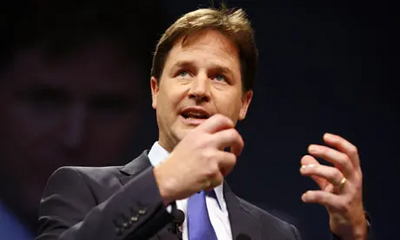Lib Dems vow to put extra £2.5bn into schooling to help poor children

Nick Clegg says his party would fund extra tuition and reduce class sizes in less advantaged areas
guardian.co.uk, Monday 1 February 2010 12.22 GMT
Nick Clegg, the Liberal Democrat leader, promised today to scrap tax credits for better-off families and channel £2.5bn more into schooling for the underprivileged.
The link between financial disadvantage and low achievement in the classroom was "as bad as it was" despite Labour's investment in education, he said.
"I think what we want, as we try and get out of this recession and rebuild a country which is fairer, is a school system that gives every single child a chance to get ahead, to live out their dreams, to fulfil their potential, irrespective of where they live, irrespective of where they were born," he told BBC Radio 4's Today programme.
Clegg said the Lib Dems would find £2.5bn for extra tuition and to reduce class sizes in less advantaged areas.
More than half of that - £1.5bn - would be raised by taking away tax credits from families on above-average incomes.
The other £1bn would come from introducing "very radical" changes in quangos and inspection regimes, and scrapping ContactPoint, a database of information on English under-18s designed to help those services working with them coordinate their work.
"One of the biggest challenges we face as a country is breaking this link between financial deprivation at home and educational underachievement in the classroom," Clegg went on.
"It is the thing that has held our country back for generations. We haven't cracked it despite all the money that's gone in from Labour. It's still as bad as it was."
Clegg set out his plans as a general election manifesto commitment in a speech to children's charity Barnardo's this morning.
Schools would attract a "pupil premium" averaging £2,500 for each of those children - about 1 million - who are entitled to free meals.
The top-up to existing funding arrangements would mean the poorest children's schools would be as well-resourced as private institutions, the Lib Dems said.
The cash would be used to cut class sizes - to as low as 16 in secondaries - and provide one-to-one tuition and catch-up lessons.
The move would be introduced in the second year of a Lib Dem government.
Clegg said the current targeting of cash at disadvantaged areas - rather than pupils - had created a new divide in educational attainment.
"On top of the performance gap everyone knows about - between children from affluent and from deprived backgrounds - there is a second performance gap, which is only now becoming understood, between poor children in different parts of Britain," he said.
"In particular, a growing gap is opening up between poor children in inner-city areas of London and poor children living elsewhere.
"The performance of children from poor backgrounds in London has, to the government's credit, improved." He said this was in large part because "far more money" was allocated to those areas than almost any other area in the UK.
"The outcome for poor children is horribly unfair - if you live in London you may have the chance to get a good education and move ahead; if you're poor and you live somewhere else you will still be left behind.
"In Lambeth, nearly 50% of children on free school meals achieve five good GCSEs, including English and maths. In Rutland, just 14% of children hit that benchmark."
